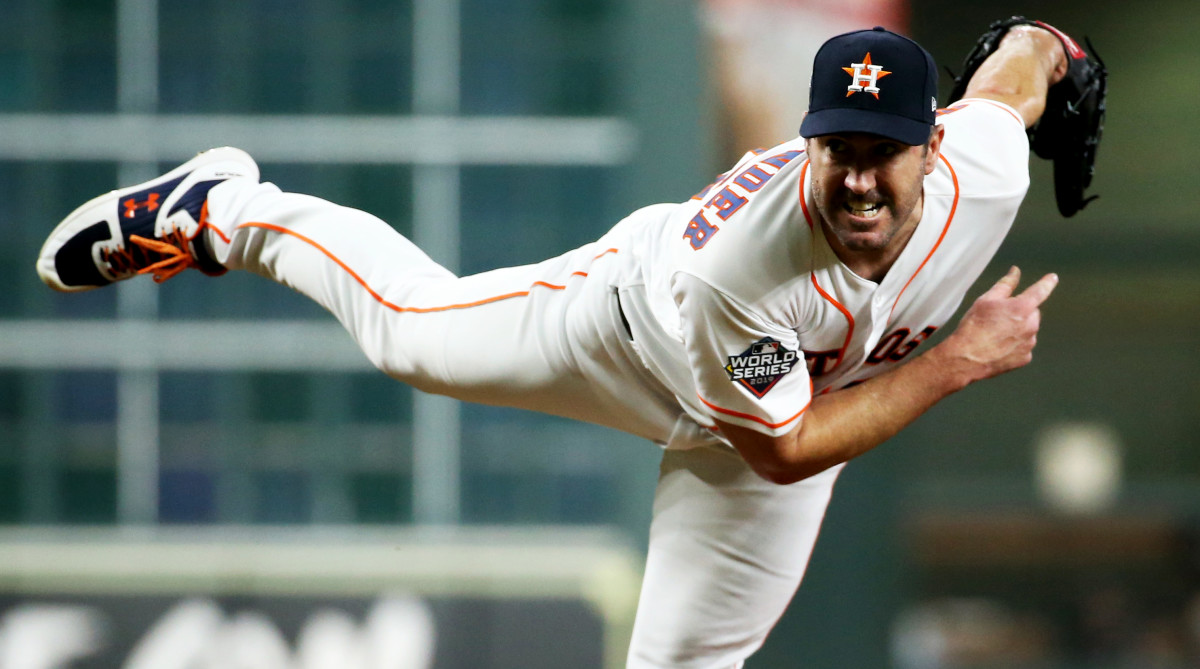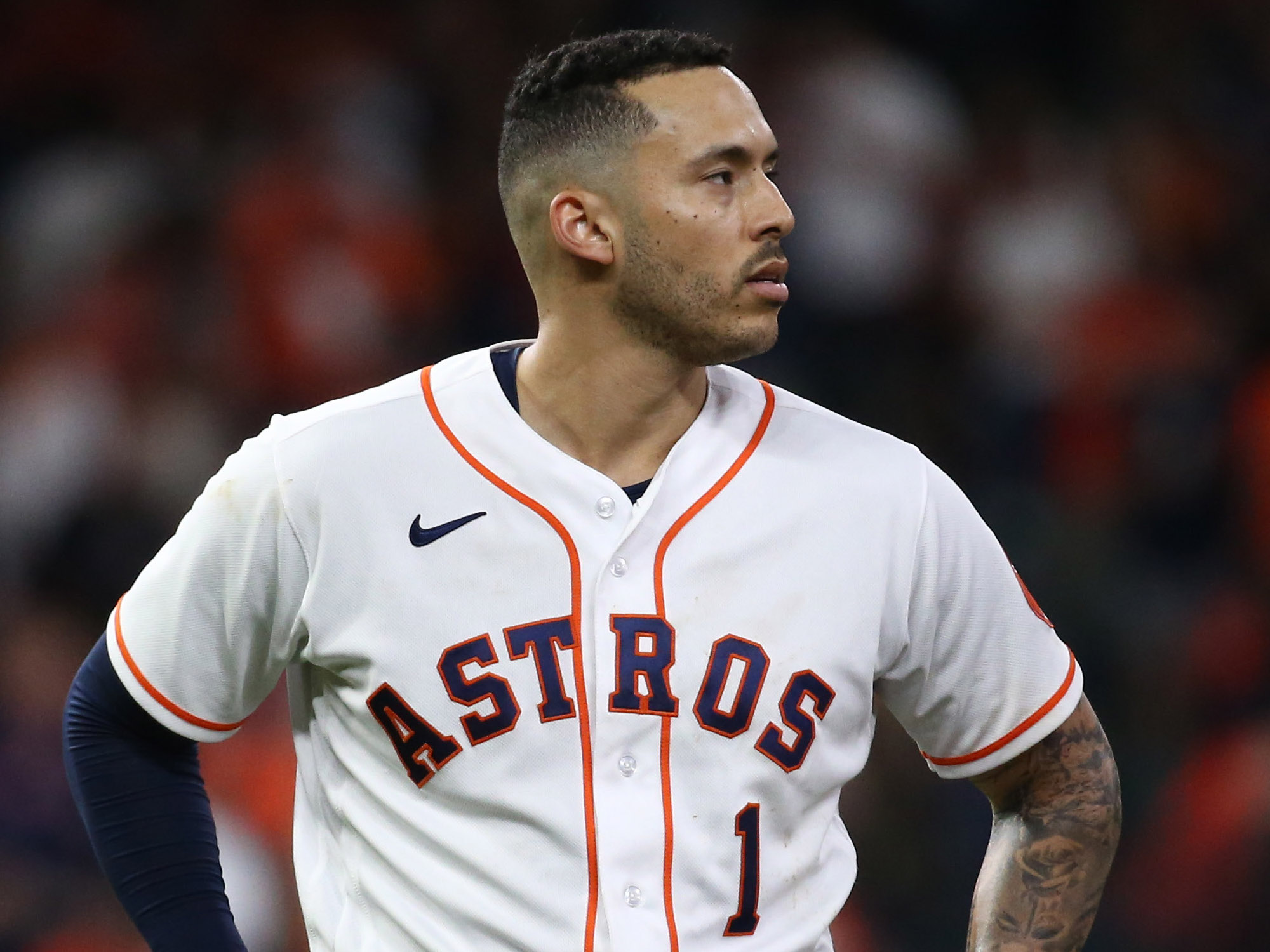The Astros Aren't Breaking Up Just Yet

Scarcely a week ago, Astros general manager James Click suggested that the team had little interest in re-signing erstwhile ace Justin Verlander. The rotation was in “a pretty good spot,” he said at the GM meetings in Carlsbad, Calif.—all but explicitly confirming that Houston did not plan to go after premium starters like Verlander.
But the starting pitching market began moving just a few days later. Houston jumped right in: News broke on Wednesday that Verlander would be back with the Astros on a two-year, $50-million contract that includes a player opt-out after the first season. It’s a pointed reminder that Houston isn’t going anywhere in 2022, even with the somber, end-of-an-era vibe of its loss in the World Series. As for Click’s comments from last week? The signing doesn’t invalidate them: Houston’s rotation was in a pretty good spot, all things considered, and the team would have had a good chance to make a run without adding much. But Verlander presented an opportunity to take this rotation from its pretty good spot and place it in a potentially great one—and, if nothing else, to make it deeper.

Verlander will slot into a group of starters that holds Lance McCullers, Jr., who’s coming off a career season; Luis Garcia, who was just named runner-up for Rookie of the Year; Framber Valdez, who adjusted quite nicely to his first full season in the rotation; and José Urquidy, Cristian Javier and Jake Odorizzi, each of whom was above-average in 2021. Which comes out to six men in the rotation—before you get to Verlander. (Hence the front office’s view of a “pretty good spot”!) Crowded? Sure. But that’s not really a problem. There’s no such thing as too much pitching depth. And that depth can get some crucial flexibility with the addition of Verlander.
Will Verlander pick up where he left off? It's too soon to say. The ace turns 39 in February and has made just one start in the last two years after struggling with an elbow injury that ultimately led to Tommy John surgery. While his November free-agent showcase reportedly went well—he wouldn’t be signing this contract right now if it hadn’t—it’s difficult to predict just how a pitcher in this situation will fare in the context of a full season. But it’s also difficult to try comparing Verlander to … well, anyone. He’s not your average soon-to-be-39-year-old. Remember that he won a Cy Young in his last complete season, at 36, and continued to be a workhorse, with the ability to reinvent himself with key adjustments in his more advanced years. Which is to say that it’s entirely possible he won’t look too far removed from how he did when we last saw him dominating the American League in 2019. But even if he’s not there—even if he’s only, say, a little below league-average, a term that hasn’t applied to him in seven years—his presence alone will open up important options for the Astros.
Like the ability to use a capable six-man rotation. This would likely help not only Verlander as he eases back in after his injury, but also McCullers, whose playoff campaign was cut short as he dealt with a forearm issue, and Javier, who has previously been used as a swingman and could benefit from an easier adjustment to full-time rotation work. (Click said at the GM meetings that the team does hope to use him primarily as a starter going forward, though Javier has never pitched more than 115 innings, even in his minor league seasons.) But Houston could also simply look to trade one of its starters. This option seems somewhat less likely—a team stockpiles this kind of depth for a reason—but it’s still worth noting. The Astros have areas of their roster that they need to address this winter, like shortstop and their bullpen, and if the front office hears the right offer around one of those, the flexibility now exists to respond. Verlander can make the Astros better by virtue of how he pitches. But he can also make them better simply by creating this fluidity on the roster.
All of that adds up to a team that should be very well-situated for next year—which might sound insultingly obvious for a club fresh off a trip to the World Series. But it was easy for the end of the Astros’ season to feel like the end of something much more. This largely centered around the impending free agency of shortstop Carlos Correa—one of the faces of the franchise, and part of the shrinking core left from the 2017 World Series, for better or for worse. While he technically could come back, that seems unlikely, and he said as much himself within a few minutes of the end of the season: “I’m not an Astro anymore.”

But there were other factors contributing to that sense of the end of an era. Verlander, one of the few other players remaining from 2017, was expected to walk in free agency, too. Manager Dusty Baker—a key part of the team’s attempt to start fresh and move past its cheating scandal—had finished out his contract. Click had completed his first full-length season as GM, and it seemed like this might be a chance for him to enact more of his own vision for the roster. The club was obviously still loaded with talent. But it seemed that it might look somewhat different when it returned in the spring.
Yet it won’t look as different as it could have. The Astros brought back Baker on a one-year contract announced earlier this month. Verlander will be back to anchor the rotation. And while a deep playoff run is never a guarantee, those chances seem better now than they did a week ago, too.
More MLB Coverage:
• Verlander's Singular Ceiling Makes Him a Unicorn Houston Had to Retain
• Rankings and Predictions for MLB's Top 50 Free Agents
• Tigers State Their Intent With a Savvy Signing
• Thor Gets a Halo ... Now What?
